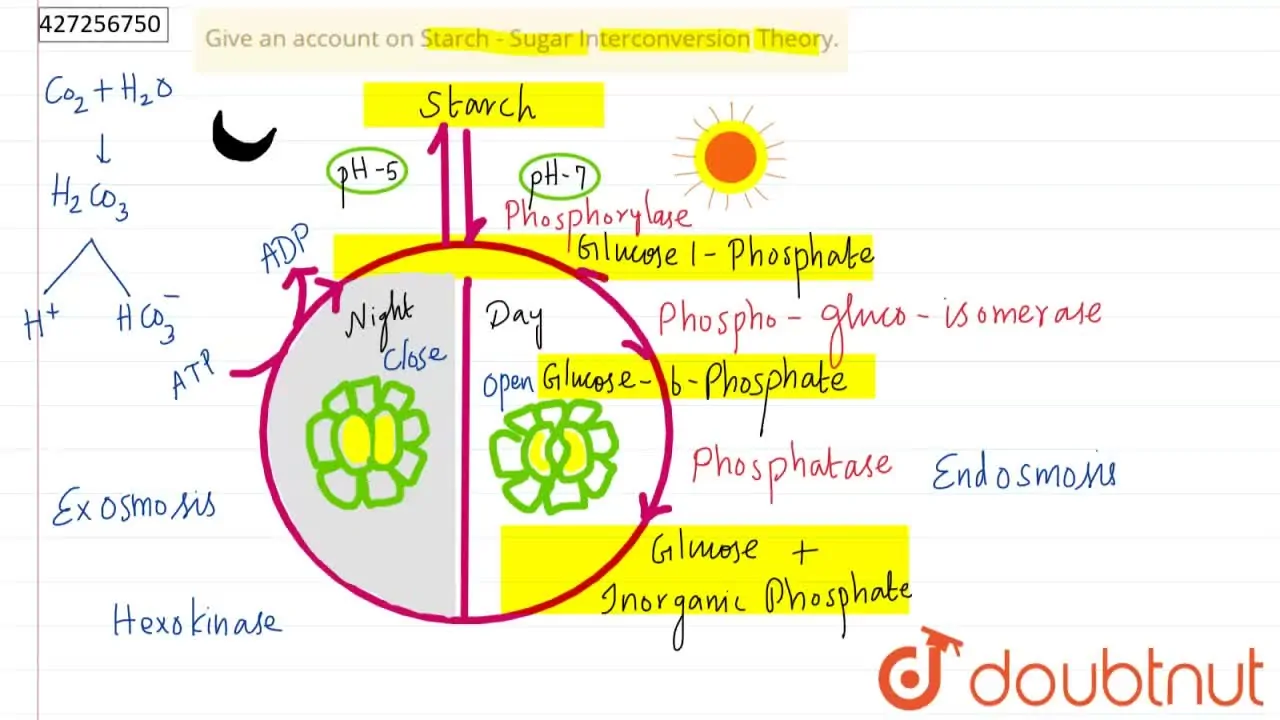Give an account on Starch - Sugar Interconversion Theory.Solution in Tamil
Video Solution
Text Solution
(i). According to Lloyd (1908) :
1. Turgidity of guard cell depends on interconversion of starch and sugar.
2. It was supported by Loftfield (1921) as he found guard cells containing sugar during the daytime when they are open and starch during the night when they are closed.
ii. According to Sayre (1920) :
1. He observed that the opening and closing of stomata depends upon change in pH of guard cells .
2. According to him stomata open at high pH during day time and become closed at low pH at night.
3. Utilization of CO2 by photosynthesis during light period causes an increase in pH resulting in the conversion of starch to sugar.
4. Sugar increase in cell favours endosmosis and increases the turgor pressure which leads to opening of stomata.
5. Likewise accumulation of CO2 in cells during night decrease the pH level resulting in the conversion of sugar to starch. Starch decreases the turgor pressure of guard cell and stomata close.
iii. According to Hanese :
1. In guard cells by Hanes (1940 ) greatly supports the starch -sugar interconversion theory.
2. The enzyme phosphorylase hydrolyses starch into sugar and high pH followed by endosmosis and the opening of stomata during light.
3. The vice versa takes place during the night.
iv. According to Steward (1964 ) :
1. He proposed a slightly modified scheme of starch-sugar interconversion theory.
2. According to him Glucose -1 phosphate is osmotically inactive.
3. Removal of phosphate from Glucose 1-phosphate converts to Glucose which is osmotically active and increases the concentration of guard cell leading to opening of stomata.
Objections to Starch -sugar interconversion theory :
i. In monocots guard cell does not have starch .
ii. There is no evidence to show the presence of sugar at a time when starch disappears and stomata open.
iii. It fails to explain the drastic change in pH from 5 to 7 by change of CO2 .
|
Updated on:21/07/2023
Similar Questions
स्टार्च ग्लूकोज इन्टरकनवर्जन सिद्धांत किसने दिया
02:33View SolutionWho among the following scientists first gave the starch sugar interconversion theory for stomatal movements ?
01:40View SolutionGive a brief account of Lamarck’s theory of evolution.
04:28View SolutionGive examples of three foods, in which sugars and starch (starch) are found in large quantities.
03:11View Solutionशर्करा, स्टार्च (मंड) तथा सेल्यूलोस प्रोटीन के सामान्य प्रकार हैं। ( )
01:40View SolutionStarch-sugar inter conversion theory was supported by
01:31View SolutionWrite the objections related to starch-sugar interconversion theory?
03:18View SolutionGive a brief account of Werner's co- ordination theory.
03:27View Solution


